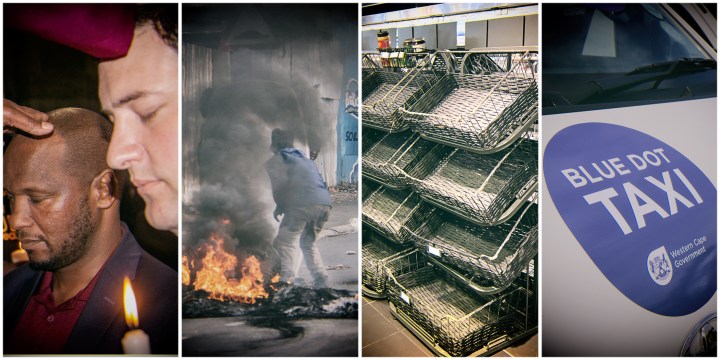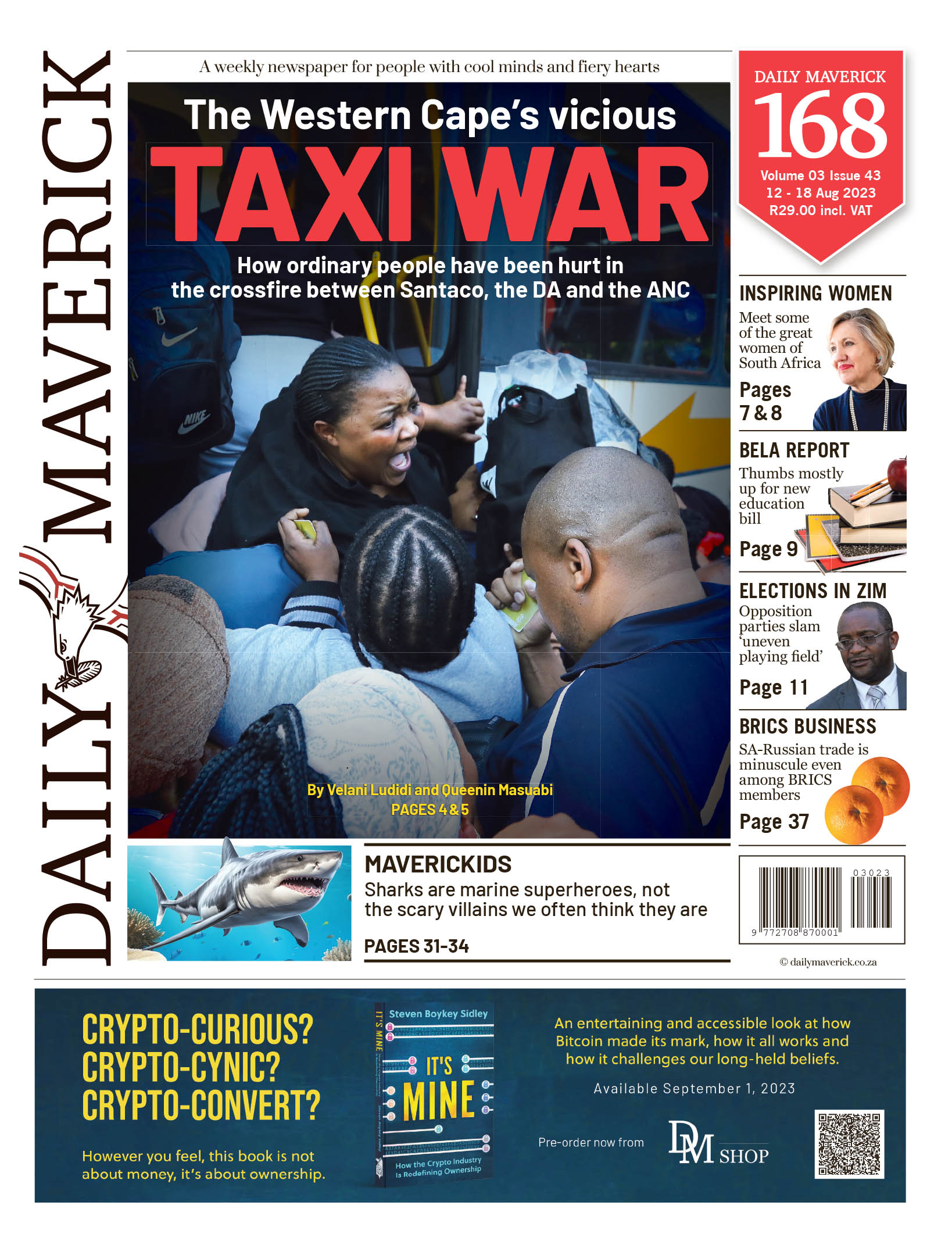LETTER FROM THE DM168 EDITOR
A bit of circumspection from all sides is perhaps what was needed to defuse the Santaco taxi strike

Sadly, in this season of winning votes for next year’s election, it may be too much to expect our politicians to apply their minds and work together for the common good, but, as always, we can dream.
Dear DM168 reader,
The taxi strike organised by Santaco over the last eight days felt like the worst kind of déjà vu to me.
My very first hard news story as a rookie reporter for South newspaper in Cape Town in the early 1990s was when I was sent to write about the violent taxi wars that were engulfing the city.
Those were terrifying times for everybody, but most of all for the people living in the Cape Flats townships caught between the crossfire of rival taxi associations fighting for a share of the transport routes.
Now 33 years later, it has again been more than a week of mayhem for all who live in Cape Town. Five precious lives lost. People fleeing in terror and fear as buses were stoned and torched. Residents robbed, mugged and forced to walk up to 45km from work to home.
Taxi drivers who are at the mercy of taxi bosses, deprived of income.
Shop shelves bare as direct suppliers of fresh bread, dairy and eggs were prevented from delivering. Motorists injured as their cars were stoned. A city under siege.
Just as tourism numbers in the Western Cape were increasing to pre-pandemic numbers, creating much-needed jobs, the murder of British orthopaedic surgeon Dr Kar Hao Teoh, who took a wrong turn travelling from Cape Town International Airport, has led to travel warnings to all foreigners who might have considered coming to visit our shores.
By-law or national law?
How did we get to this horrible place? As always, there are opposing views.
Mandla Hermanus, the Western Cape leader of Santaco, says the strike was triggered by the impounding of more than 1,000 taxis every month by the City of Cape Town, for minor infractions not covered by the national road traffic legislation but by the City’s new strict by-law.
Rooting on the side of the taxi owners were none other than ANC Minister of Transport Sindisiwe Chikunga and our Cat in the Hat Minister of Police Bheki Cele. The Cabinet has backed these ministers, directing Chikunga to ensure that any taxi-operating conditions contradicting the national law are removed from the City’s by-laws.
Executive Mayor Geordin Hill- Lewis and his swashbuckling DA strongman answer to the Cat in the Hat, JP Smith, insist that all impounded taxies had violated national laws, not the new by-law. The mayor, rightly, refused to be bullied by the taxi operator bullies. The taxi operators refused to be bullied by JP Smith.
At stake for the taxi owners, their livelihoods. At stake for the mayor and Smith, and the two ANC ministers, their political currency. A stare-down that erupted into murder, looting and mayhem.
Cape Town’s taxi wars have a long history, and no matter how much many of us would want to wish it away, the roots of the conflict can be traced to the apartheid era.
Apartheid’s influx control laws limited a few Black people to townships far away from city centres and places of work, while forcing the majority of Black people to live in rural Bantustans.
In the 1980s, when the apartheid state was on its last legs, there was – as there is now – an influx of people from rural areas, who competed for jobs, leading to conflict between rival taxi associations, some working with gangsters to help them maintain control of lucrative routes.
The post-apartheid government tried to regulate the taxi industry through the Taxi Recapitalisation Programme, but as Erik Bähre writes in his research paper on Cape Town’s taxi associations, the Taxi Recapitalisation Programme led to a mafia-like control, through what he called “trickle-up economics” – money trickles up from small drivers and taxi owners to powerful taxi associations, which act as “brokers between taxi owners, car dealers, banks and government agencies”. We could argue it also trickles up to corrupt civil servants and politicians.
A better way
Could the latest taxi strike have been handled differently? Could there have been a better way to achieve a more favourable outcome for all the residents of the city?
However appealing kragdadigheid might be to those of us who are gatvol with the could-not-give-a-damn attitude of many taxi owners and drivers, the mayhem of the past two weeks is an indication that zealously wielding the mighty stick of impounding might not have been the most effective way to change hearts and minds of taxi owners and drivers to practise road safety and be more commuter-centric.
JP Smith’s lament on his Facebook page – “The journalists aren’t listening. The media stations aren’t listening. The national ministers aren’t listening. Minister Chikunga, why are you trying to incite further violence by making false statements?” – was not exactly taken out of a page of Dale Carnegie’s How to Win Friends and Influence People. Something which Cornelius Lourens in a responding post to Smith picked up on.
“JP, how is insulting politicians and ministers, using social media, helping the situation? Do you like the social theatre where you can insult in binary fashion rather than as a civil servant interact, empathise and reach across the aisle? Do you like all the likes you get on social media? You think that is your score card?”
A bit more circumspection on all sides is perhaps what is needed.
The Western Cape government has in the past shown a much more effective carrot method of improving the minibus taxi service with its very innovative Blue Dot taxi service pilot project, which ended because of a lack of funding. This was an incentive programme to reward improved driving behaviour and service quality, while progressing the formalisation of the industry.
If Ministers Chikunga and Cele really cared about improved public transport, they would have a chat with the officials and DA politicians involved in the pilot project, run by the Western Cape Ministry of Mobility, and encourage the national government and big business to look into rolling out the campaign in every city of South Africa.
Sadly, in this season of winning votes for next year’s election, it may be too much to expect our politicians to apply their minds and work together for the common good, but, as always, a woman can dream.
In this week’s DM168 lead story, Velani Ludidi (who has provided excellent on-the-ground reporting of the strike) and our senior political writer Queenin Masuabi join the dots and delve a bit deeper into what exactly went on behind the scenes to give you an insight into the causes, the politics and the aftermath of the taxi strike.
If any of you have any thoughts on this or experiences to share, write to me at [email protected]
Yours in defence of truth,
Heather
This story first appeared in our weekly Daily Maverick 168 newspaper, which is available countrywide for R29.

















Throughout this saga the reporting of DM was forgiving for SANTACO and being hard Cape Town City authority and looking for reasons to justify the actions of santaco. Now it is apartheid and “kragdadigheid” of Afrikaans JP Smith that are blamed. We are not living 30 years ago when you were a hippie student with issues. This is what you want for your children.? DS
Law is not typically about compromise.
Obey it or take the hit, just like everyone.
Any deviation from this approach is dangerous in the extreme for our country.
Our law is precedent based, so it is a VERY bad idea to set poor precedents.
This opinion comes across a little to apologetic when it comes to the taxi drivers, their bosses and benefactors, painting them as victims and the city as heavy handed. It fails to mention a few key facts, or downplays them. First of all I think it is very important to note that the taxi associations have for years actively been damaging and destroying any competing infrastructure. They intimidate and physically hurt (and in some cases kill) bus drivers and e-hailing drivers, lately even private people trying to help out with lifts. This has all been happening long before the strike. It is mafia like behavior, no matter how you look at it, and not just a sudden reaction to the city applying the law. 25 years some of the most horrific accidents imaginable are clearly due to the taxi industry flouting the law, while the city, other traffic participants and passengers have been pleading, yet no concessions made. While I hear commentators lament the arrogance of the city, no one talked about the arrogance of ignoring laws that save lives, with internal employment rules that cannot possibly be legal that primarily fatten the bottom line of a couple of well connected cadres.
I am ok with “a bit more circumspection on all sides” but we need to be honest about where the primary focus of problems lie, and need to be very clear about it. And at this point it’s not about CoCT showing “kragdadigheid”,but stopping a damaging criminal part of our society from running even more amok.
Good comment Karl. I’ll second it.
I want to say well done to the City of Cape Town . The only province with an active police presence. Continue with your good work. Well done for speaking with one voice.
DM definitely comes across as being in favour of santaco. Law is law and it must be followed.
Sad that we must always go back to apartheid too.
So many lives lost because of the lawless taxi industry. Constantly intimidating law abiding citizens. I definitely support other modes of transport for our people.
DM certainly seems to be ‘blind’ to the hypocrisy of Santanco but, even more worrying, anti-DA. The DA demonstrates daily its ability to govern for the benefit of those citizens who are fortunate enough to live in DA governed areas.
There is no point in doing outstanding journalism in exposing the corruption and incompetence of ANC governance and then repeatedly being less than evenhanded when referring to the only realistic political alternative to the ANC.
Sorry, you’ve not read the room. Don’t understand DM’s obsessive negative stance towards the DA.
Whether we like it or not, the taxi industry is a hugely important industry, essential in our society to get thousands of people to work. Obviously vehicles must be roadworthy, drivers licenced, and basic laws like not driving down emergency lanes and through red traffic lights must be obeyed. But I got the impression that vehicles were impounded at times for relatively minor offences ?? This is not fair – even taxi drivers have to earn a living ! I also think all our cities could do more to create safe zones where drivers can stop, so they don’t have to use intersections to pick up/drop off passengers.
Your comment is out of order Heather! The ANC government and SANTACO are guilty of politicising this issue and causing millions of rands of damage. Your reference to “apartheid” and “strongman” is just plain rubbish. There is no soft soaping of an industry that uses brute force to undermine the rule of law in South Africa and is party to the destruction of alternative public transport and enabling infrastructure. Kudos to Hill-Lewis, Winde and their officials for standing their ground.
Nowhere is there a mention of the destruction of the Cape Peninsula suburban railway system under the ANC and how this has added to the power of the taxi Industry when they withdraw services.
There has to be many Improvements to getting 75% of our people around safely and without disruption.
More ranks to act as hubs and when providing the hubs, put in place a vehicle driver permit license condition check. Quick 5 point 1 minute check before taxi departs. They’ll want to use the hubs, so make this the ticket to use it. Four officials there will be much more efficient than pull-overs and roadblocks.
More places on key routes for pickup dropoff. Not a rank, literally size of a bus stop. Then fine not using a nearby point heavily. City should build stops into their road plans as standard requirement. Developer wants to build a mall – or a new industrial park – right sir you need this and that for transport interface. There are factories around me with total road chaos at shift changes. Give up 10 parking spots for a drive through interface off-the-road!
Finance and insurance and institutions and the RAF need to join the program and as part of their deal, compulsory that vehicle must come by on its designated Sunday morning or whatever quiet time schedule for every 3 months get checked. It is in their interest so they can staff and run these. It is madness to have several thousand idle vehicles in pounds.
What makes you think the taxi industry want any of that? Taxis stop where they want when they want. They don’t care whether their vehicles are roadworthy or not – if they concerned then law enforcement would impound a thousand of them each month.
Do you REALLY think the taxi industry care about insurance – c’mon, pull the other one.
The Taxi industry want one thing and that is to do what they want when they want irrespective of what anyone else wants or thinks – oh and get in their way and the WILL kill you as the have demonstrated countless times over the years
*correction to typo*
If the taxi owners were concerned about their vehicles being roadworthy and legal in all respects then law enforcement wouldn’t be impounding a thousand of them each month